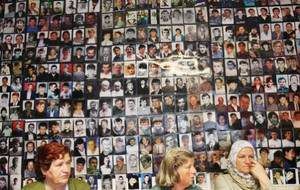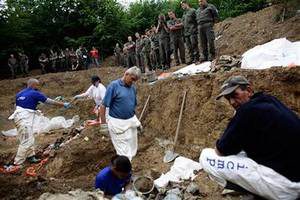TRIAL International and six NGOs denounce the ordeal of thousands of relatives of disappeared persons in Mexico in their attempt to obtain assistance and redress.
On paper, Mexico is equipped with both the legislative tools and the institutional venues to guarantee social assistance and reparation to relatives of disappeared persons. But behind this façade, the bleak reality is that thousands of families are left to deal alone with the emotional upheaval of enforced disappearance, exacerbated by material deprivation.
When men are forcibly disappeared, women and children often suffer too, because the head the household and main breadwinner is no longer around. The disappearance of a single individual therefore results in the disruption of entire families. Guarantees of employment or property are crucial not only to cover the expenses of the search for their loved ones, but also to ensure their sheer survival.
An inhumane bureaucratic maze
Under international law, States have the obligation to provide adequate reparation and social assistance to the families of disappeared persons.
But in Mexico, they often find themselves trapped in a bureaucratic maze. The institutions supposed to help them actually hinder their attempts: officers in charge frequently prove unwilling or unable to adequately attend victims and their families.
Worse still, episodes of re-victimisation may occur, effectively discouraging relatives to uphold their rights. A group of wives of disappeared persons was told that they should find a job instead of “begging for support”, since their husbands would not return anyway.
Similarly, many relatives applying for medical and psychological assistance have been turned down as they were unable to demonstrate the trauma they had been subjected to. Other cases of mistreatments include false information or the loss of files.
Adding insult to injury, relatives of disappeared persons are often requested to anticipate expenses to cover their basic needs, such as medical support. As a result, some families are forced to apply for loans or mortgages. Now the Mexican authority in charge of social support is failing to reimburse these expenses, furthering their humiliation, economic hardship and marginalisation.
Foreigners have even fewer rights
The situation is even worse when the relatives of the disappeared person reside outside of Mexico and this is particularly grave knowing that thousands of migrants – mainly from Central America – disappeared in Mexico in their attempt to reach the USA or Canada. Although the law entitles also foreign relatives of disappeared persons to social support and reparation, practical obstacles make it almost impossible to fulfil these rights.
On the one hand, appointing a representative in Mexico can prove very hard for relatives living abroad. On the other, relatives themselves are unable to travel there for lack of a visa and economic means to cover their travel.
The few that manage to formally register as “victims” – and are thus entitled to social support – may in practice be unable to access said support. Ms. E.D. lived in El Salvador when her son disappeared in Mexico in 2011. It took her 4 years to be formally recognised as a victim in Mexico. She was requested to come to Mexico to obtain medical and psychological support, only to be told upon arrival that she did not fit all the requirements. She was sent back to El Salvador empty-handed, with still no answer as to her son’s fate. Countless mothers, fathers and siblings face the same fate every day.
In November 2016, TRIAL International and six Mexican NGOs denounced these inhumane situations to the United Nations Working Group on Enforced or Involuntary Disappearances (WGEID). The report illustrates with examples the obstacles faced by thousands of relatives of disappeared persons.
The WGEID is now expected to seek explanations from Mexico and transmit recommendations to the State.
Read the full report (in Spanish)
Read the executive summary (in English)
An op-ed by Gabriella Citroni
TRIAL International and six NGOs denounce the ordeal of thousands of relatives of disappeared persons in Mexico in their attempt to obtain assistance and redress.
On paper, Mexico is equipped with both the legislative tools and the institutional venues to guarantee social assistance and reparation to relatives of disappeared persons. But behind this façade, the bleak reality is that thousands of families are left to deal alone with the emotional upheaval of enforced disappearance, exacerbated by material deprivation.
When men are forcibly disappeared, women and children often suffer too, because the head the household and main breadwinner is no longer around. The disappearance of a single individual therefore results in the disruption of entire families. Guarantees of employment or property are crucial not only to cover the expenses of the search for their loved ones, but also to ensure their sheer survival.
An inhumane bureaucratic maze
Under international law, States have the obligation to provide adequate reparation and social assistance to the families of disappeared persons.
But in Mexico, they often find themselves trapped in a bureaucratic maze. The institutions supposed to help them actually hinder their attempts: officers in charge frequently prove unwilling or unable to adequately attend victims and their families.
Worse still, episodes of re-victimisation may occur, effectively discouraging relatives to uphold their rights. A group of wives of disappeared persons was told that they should find a job instead of “begging for support”, since their husbands would not return anyway.
Similarly, many relatives applying for medical and psychological assistance have been turned down as they were unable to demonstrate the trauma they had been subjected to. Other cases of mistreatments include false information or the loss of files.
Adding insult to injury, relatives of disappeared persons are often requested to anticipate expenses to cover their basic needs, such as medical support. As a result, some families are forced to apply for loans or mortgages. Now the Mexican authority in charge of social support is failing to reimburse these expenses, furthering their humiliation, economic hardship and marginalisation.
Foreigners have even fewer rights
The situation is even worse when the relatives of the disappeared person reside outside of Mexico and this is particularly grave knowing that thousands of migrants – mainly from Central America – disappeared in Mexico in their attempt to reach the USA or Canada. Although the law entitles also foreign relatives of disappeared persons to social support and reparation, practical obstacles make it almost impossible to fulfil these rights.
On the one hand, appointing a representative in Mexico can prove very hard for relatives living abroad. On the other, relatives themselves are unable to travel there for lack of a visa and economic means to cover their travel.
The few that manage to formally register as “victims” – and are thus entitled to social support – may in practice be unable to access said support. Ms. E.D. lived in El Salvador when her son disappeared in Mexico in 2011. It took her 4 years to be formally recognised as a victim in Mexico. She was requested to come to Mexico to obtain medical and psychological support, only to be told upon arrival that she did not fit all the requirements. She was sent back to El Salvador empty-handed, with still no answer as to her son’s fate. Countless mothers, fathers and siblings face the same fate every day.
In November 2016, TRIAL International and six Mexican NGOs denounced these inhumane situations to the United Nations Working Group on Enforced or Involuntary Disappearances (WGEID). The report illustrates with examples the obstacles faced by thousands of relatives of disappeared persons.
The WGEID is now expected to seek explanations from Mexico and transmit recommendations to the State.
Read the full report (in Spanish)
Read the executive summary (in English)
Gabriella Citroni, Senior Legal Advisor

 In the past, the UNWGEID closely followed the situation of disappeared people in BiH. However, from 2000, the issue was basically left to domestic authorities and to initiatives undertaken by other actors working in the field. Some exhumations have been carried out and a number of legislative initiatives have been undertaken. Nevertheless, significant obstacles to the full implementation by BiH of the 1992 Declaration remain and should be addressed, as the rights of victims of enforced disappearance and their relatives continue to be impaired.
In the past, the UNWGEID closely followed the situation of disappeared people in BiH. However, from 2000, the issue was basically left to domestic authorities and to initiatives undertaken by other actors working in the field. Some exhumations have been carried out and a number of legislative initiatives have been undertaken. Nevertheless, significant obstacles to the full implementation by BiH of the 1992 Declaration remain and should be addressed, as the rights of victims of enforced disappearance and their relatives continue to be impaired.